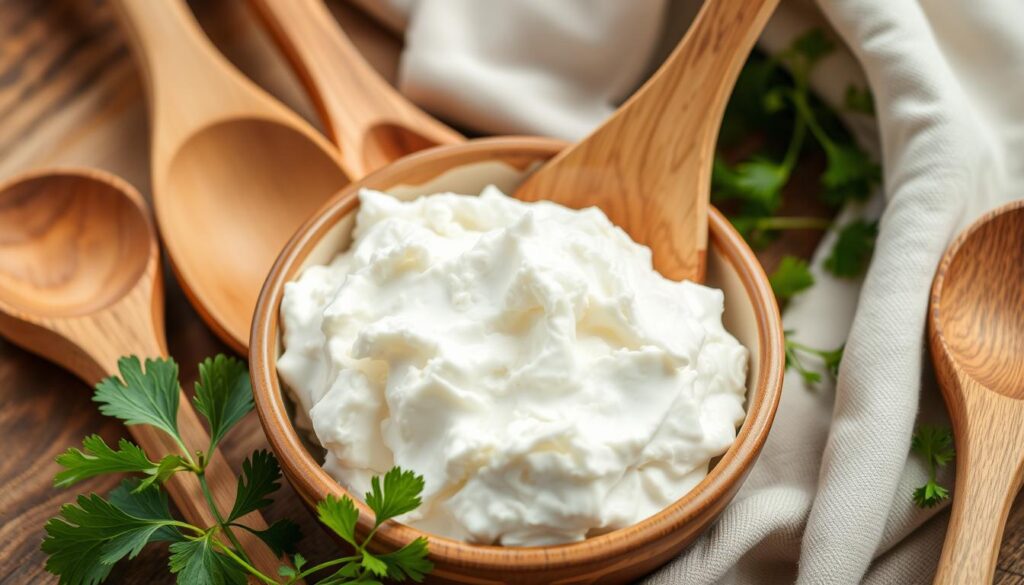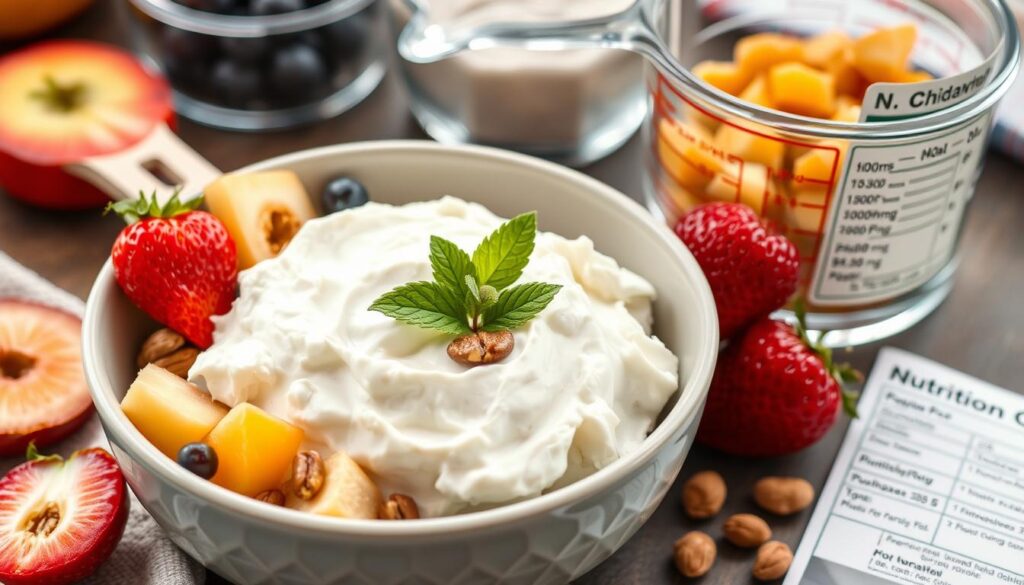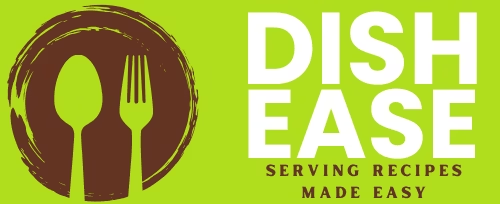Is cottage cheese a fat or carb? This creamy, versatile dairy product often sparks curiosity among health-conscious eaters. While it’s commonly known for its high protein content, cottage cheese also contains some fat and minimal carbs, making it a balanced option for many diets. Whether you’re counting macros or looking for a nutrient-packed snack, understanding its composition can help you make informed choices. Let’s dive into the nutritional breakdown of cottage cheese!
Table of Contents
What is Cottage Cheese?
Cottage cheese is a nutritious dairy product loved for its unique texture and high protein. It’s a key part of many diets because of its health benefits. It’s also great as a snack on its own.

Overview of Cottage Cheese
Cottage cheese is made by curdling milk. This process separates the curds from the whey. The curds are what make up the cheese, giving it a creamy texture and mild taste.
It’s a healthy snack that goes well with many meals. It’s perfect for those looking for a nutritious option.
History and Popularity
Cottage cheese has been around for centuries. It was first enjoyed by ancient societies. In the early 20th century, it became popular in the US as a high-protein food.
Today, it’s even more popular. People love it for its health benefits and role in weight management.
Types of Cottage Cheese
There are different types of cottage cheese to suit everyone’s taste:
- Full-fat cottage cheese
- Low-fat cottage cheese
- Non-fat cottage cheese
All types are packed with protein. They’re great for those looking for healthy, high-protein foods. Cottage cheese can be used in salads, smoothies, or as a spread. Its versatility makes it a favorite among many.
Nutritional Breakdown of Cottage Cheese
Understanding cottage cheese’s nutrition is key for making smart food choices. This dairy product is packed with valuable nutrients. Let’s explore its macronutrients and vitamins and minerals.
Macros: Fat, Carbs, and Protein
Cottage cheese is great for those watching their carbs. One cup has just 6 grams of carbs, fitting into many diets. But its protein is the real star. A cup has up to 28 grams of protein, helping muscles grow and repair.

Vitamins and Minerals
Cottage cheese is also full of vitamins and minerals. It’s a big source of calcium for strong bones and vitamin B12 for energy. It also has phosphorus, selenium, and riboflavin, supporting health and energy.
Comparison to Other Dairy Products
Cottage cheese beats many dairy products for low carbs and high protein. Yogurt and some cheeses have more carbs. Here’s how cottage cheese compares to popular dairy:
| Dairy Product | Calories (per cup) | Protein (g) | Carbs (g) | Fat (g) |
|---|---|---|---|---|
| Cottage Cheese | 206 | 28 | 6 | 9 |
| Greek Yogurt | 220 | 20 | 10 | 10 |
| Cheddar Cheese | 533 | 30 | 1 | 44 |
Is Cottage Cheese Healthy?
Cottage cheese is seen as a healthy choice for a balanced diet. It offers many health benefits. It’s important to understand these benefits and how cottage cheese fits into different diets.
Health Benefits of Cottage Cheese
Cottage cheese is full of protein, calcium, and vitamins. Its high protein helps you feel full and control hunger. It also supports strong bones and teeth.
It comes in low-fat versions, which are great for those watching their weight.
Ideal for Various Diets
Cottage cheese is great for many diets. It’s low in calories but high in nutrients, making it perfect for weight loss. Vegetarians find it a good protein source.
It’s also versatile, working well in both sweet and savory dishes. This makes it a top pick for healthy snacks.
- Keto Diet: Cottage cheese is low in carbs, making it keto-friendly.
- Vegetarian Diet: It’s a high protein option for vegetarians.
- Low-Fat Diet: Choosing low-fat cottage cheese supports a low-fat diet.
Possible Concerns or Allergies
While cottage cheese is healthy, there are concerns like lactose intolerance and allergies. People with lactose intolerance might feel sick. Choosing lactose-free versions helps.
Some may be allergic to dairy proteins. It’s best to talk to a doctor before adding cottage cheese to your diet.
Knowing these concerns helps you enjoy cottage cheese safely. Adding it to your diet in a smart way can boost your health.
Cottage Cheese and Weight Loss
Adding cottage cheese to your weight loss diet can really help. It’s a food that fits into many meal plans. It’s full of nutrients and keeps you feeling full.
Low-Calorie Snack Option
Cottage cheese is low in calories, making it a great healthy snack. It has lots of nutrients but not many calories. You can enjoy it at any time of day without feeling guilty.
High Protein Content and Satiety
Cottage cheese is packed with protein, which is key for weight loss diets. Protein helps you feel full, so you eat less. Pairing it with other high-protein foods like nuts or eggs boosts its benefits.
Incorporating it into Diet Plans
It’s easy to add cottage cheese to your meals. Mix it with fruits for a tasty snack or add it to salads for extra texture. Nutritionists say it’s a great choice for a weight loss diet.
| Meal | Serving Suggestion |
|---|---|
| Breakfast | Cottage cheese with berries and a sprinkle of nuts |
| Lunch | Salad topped with a scoop of cottage cheese |
| Dinner | Grilled chicken with a side of cottage cheese |
| Snack | Plain cottage cheese with sliced cucumbers |
How to Use Cottage Cheese
Cottage cheese is great for many dishes, from sweet to savory. It’s full of nutrients, making it perfect for healthy snacks and low-carb foods.
Recipe Ideas and Serving Suggestions
Adding cottage cheese to your meals can be fun. Here are some ideas to get you started:
- Breakfast Bowls: Mix cottage cheese with berries, honey, and granola for a tasty morning.
- Creamy Smoothies: Blend cottage cheese, fruits, almond milk, and almond butter for a protein-packed smoothie.
Pairing with Fruits and Nuts
Combining cottage cheese with fruits and nuts boosts its flavor. Try these pairings for a healthy snack:
- Apple and Walnut Salad: Toss apple slices, walnuts, and cottage cheese with a light dressing.
- Pineapple and Almond Delight: Mix pineapple, almonds, and cottage cheese for a tropical treat.
Savory Dishes Featuring Cottage Cheese
Cottage cheese is also great in savory dishes. It’s a key ingredient in low-carb foods:
- Stuffed Bell Peppers: Fill bell peppers with cottage cheese, ground turkey, and spices, then bake.
- Cottage Cheese Pancakes: Add cottage cheese to pancake batter for protein-rich pancakes.
| Recipe Name | Primary Ingredients | Benefit |
|---|---|---|
| Breakfast Bowls | Fresh Berries, Honey, Granola | High in Fiber, Antioxidants |
| Creamy Smoothies | Fruits, Almond Milk, Almond Butter | Rich in Protein and Healthy Fats |
| Apple and Walnut Salad | Apple, Walnuts, Vinaigrette | High in Vitamins and Omega-3 |
| Pineapple and Almond Delight | Pineapple, Almonds | Tropical Flavor, Healthy Fats |
| Stuffed Bell Peppers | Bell Peppers, Ground Turkey, Spices | Low-Carb, High Protein |
| Cottage Cheese Pancakes | Pancake Batter, Cottage Cheese | High in Protein, Fluffy Texture |
Whether you’re making complex cottage cheese recipes or simple snacks, cottage cheese is versatile. Explore these low-carb foods and find many ways to use cottage cheese in your cooking.
Cottage Cheese in Different Diets
Cottage cheese is a versatile and nutritious food. It can fit into various diets. Whether you’re on a keto diet, looking for vegetarian protein, or need lactose-free options, cottage cheese has something for everyone.
Keto and Low-Carb Options
The keto diet focuses on low-carb, high-fat foods. Cottage cheese is a great choice because it’s low in carbs and high in protein. You can use it as a creamy base for dips or mix it with berries for a low-carb dessert.
Vegetarian and Protein Sources
Cottage cheese is a top pick for vegetarian protein. It has a lot of protein per serving, which is good for muscles. Try it with spinach or as a filling in stuffed bell peppers for a protein-packed meal.
Lactose-Free Alternatives
People with lactose intolerance can still enjoy cottage cheese. Look for lactose-free cottage cheese. These options remove lactose but keep the nutrients. This way, those with lactose intolerance can eat cottage cheese without discomfort.
Misconceptions About Cottage Cheese
Cottage cheese is often misunderstood. By clearing up these myths, we can see its true value. This helps us know the facts from fiction.
Common Myths Explained
Many think cottage cheese is too fatty. But, it comes in low-fat and non-fat options. This lets people pick what’s right for them without losing health benefits. Some worry about its sodium, but it’s okay in small amounts.
Separating Fact from Fiction
Studies and health experts back up cottage cheese’s benefits. A serving gives a lot of protein and not much sugar. This helps you feel full and keeps muscles strong.
Cottage cheese also has important vitamins and minerals like calcium. It’s good for bones. Unlike some think, it doesn’t make you gain weight. It’s high in protein and low in calories.
Here’s a comparison of cottage cheese with other dairy products:
| Product | Calories | Total Fat (g) | Carbohydrates (g) | Protein (g) |
|---|---|---|---|---|
| Low-fat Cottage Cheese | 81 | 1.2 | 3.6 | 14 |
| Whole Milk | 149 | 7.9 | 11.7 | 7.7 |
| Greek Yogurt | 137 | 5.0 | 6.0 | 14 |
In short, looking at the facts shows cottage cheese’s value in a healthy diet. Knowing its real benefits helps us make better food choices.
Cottage Cheese vs. Other Cheese Types
Many people love exploring different cheeses. We’ll look at the nutritional values, texture, taste, and best uses of many cheese types.
Nutritional Comparison
We compare the nutrition of popular cheeses:
| Cheese Type | Calories | Fat (g) | Carbs (g) | Protein (g) |
|---|---|---|---|---|
| Cottage Cheese | 98 | 4.3 | 3.4 | 11.1 |
| Cheddar | 113 | 9.4 | 0.4 | 7 |
| Brie | 94 | 7.9 | 0.1 | 5.9 |
| Feta | 75 | 6.1 | 1.1 | 4 |
Texture and Taste Differences
- Cottage Cheese: Creamy and slightly tangy, great for low-carb diets.
- Cheddar: Firm and sharp, loved for its bold taste.
- Brie: Soft and creamy, with a mild, buttery flavor, perfect for fancy dishes.
- Feta: Crumbly and salty, adds flavor to salads and Mediterranean dishes.
Best Uses for Each Cheese Type
Each cheese is best used in different ways:
- Cottage Cheese: Great in salads, dips, and as a snack, especially for low-carb diets.
- Cheddar: Best for sandwiches, burgers, and macaroni and cheese.
- Brie: Ideal for fancy charcuterie boards, baked Brie, or with fruits.
- Feta: Adds flavor to Greek salads, wraps, and baked dishes like spanakopita.
This cheese comparison shows how versatile cheese can be in cooking. Knowing these differences can improve your cooking and nutrition.
Storing and Preparing Cottage Cheese
Proper handling and storage of cottage cheese are key to keeping it fresh and nutritious. This guide offers tips on how to store it right, prepare it well, and understand when it’s past its prime. This ensures your dairy products stay safe and delicious.
Best Practices for Storage
Keeping cottage cheese fresh starts with the right storage. Store it in the fridge at a cool temperature, below 40°F (4.4°C). Use an airtight container to keep it fresh and prevent moisture loss. Also, keep it away from strong-smelling foods to preserve its taste.
How to Prepare Cottage Cheese
Preparing cottage cheese is easy and important for safety. Always check for spoilage before using it, like an odd smell or mold. Stir it well for a creamy texture. You can enjoy it on its own or mix it into various dishes, adding variety to your meals.
Expiration and Shelf Life
Knowing when cottage cheese expires is crucial for safety. Unopened cottage cheese can last up to two weeks after the “sell-by” date in the fridge. Once opened, use it within five to seven days. Trust your senses; if it looks, smells, or tastes bad, throw it out to avoid food safety issues.
Following these tips helps keep cottage cheese fresh and safe. This way, you can enjoy your favorite dairy product without worrying about spoilage.
Conclusion: The Role of Cottage Cheese in Your Diet
Cottage cheese is a top choice for a healthy diet. It’s packed with protein and low in carbs. This makes it great for many diets, from weight loss to high-protein snacks.
Final Thoughts on Nutritional Value
Cottage cheese is full of vitamins and minerals like calcium and vitamin B12. These help keep your bones strong and support your metabolism. Adding cottage cheese to your meals can help meet your daily nutritional needs.
Making Informed Choices with Cottage Cheese
Now you know how to use cottage cheese in your meals. It fits well in many diets, including low-carb and vegetarian ones. Knowing its benefits and how to use it can make your diet healthier and tastier.
FAQ
Is cottage cheese a fat or carb?
Cottage cheese is mostly protein with some fat and very little carbs. The exact amounts depend on the type you choose. For example, low-fat cottage cheese has more protein and less fat and carbs.
What is the nutritional value of cottage cheese?
Cottage cheese is packed with protein, making it a top choice for protein lovers. It also has important vitamins and minerals like calcium, vitamin B12, and phosphorus. This makes it a healthy snack for many diets.
How does cottage cheese compare to other dairy products?
Cottage cheese has a unique mix of nutrients compared to other dairy. It has less fat and carbs than many cheeses but more protein. It’s a great choice for those watching their calories and following keto diets.
Can cottage cheese fit into a weight loss diet?
Yes, cottage cheese is perfect for weight loss diets. It’s low in calories but high in protein, which helps you feel full. It’s also good for keeping muscle mass while losing fat.
What are some recipe ideas with cottage cheese?
Cottage cheese is versatile and can be used in many ways. Try mixing it with fruits and nuts for a snack, adding it to smoothies, or using it in savory dishes like lasagna. It’s great for low-carb recipes.
Is cottage cheese suitable for a keto diet?
Cottage cheese is good for keto diets, especially the low-fat and full-fat types. It’s low in carbs, making it easy to stay in ketosis while enjoying its health benefits.
Are there lactose-free alternatives to cottage cheese?
Yes, there are lactose-free cottage cheese options for those who can’t digest lactose. These alternatives keep the nutritional benefits of regular cottage cheese but without the lactose.
What are the common misconceptions about cottage cheese?
Some people think cottage cheese is fattening or lacks nutrients. But, when chosen wisely and eaten in moderation, it’s actually very nutritious. It’s important to correct these myths with scientific facts.
How should cottage cheese be stored and prepared?
Store cottage cheese in the fridge in a sealed container to keep it fresh. Use it before it expires for the best taste and nutrition. You can enjoy it cold or use it in various dishes.

